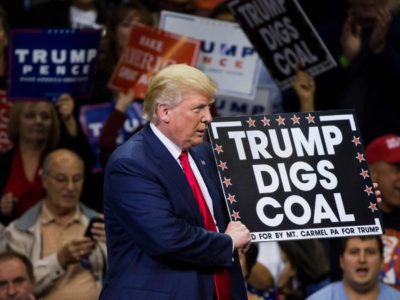The Conservative Assault on Presidential Administration
Are they afraid of “faceless bureaucrats”? Or Democratic Presidents?
Conservatives are on a campaign to reduce agency discretion. They don’t seem to realize that in today’s world, that really amounts to an attack on presidential power. These days, it’s generally not bureaucrats or even cabinet officers who make the real decisions about regulation. It’s the White House. So the campaign against the administrative state really amounts to an effort to neuter the President’s authority over domestic policy.
This conservative effort takes several forms. One is an attack on the Chevron doctrine. Under Chevron, if a statute is ambiguous, courts will defer to a reasonable agency interpretation of the law. In reality, on any controversial or economically significant issues, the interpretation will be decided by the White House. In fact, one of the justifications for Chevron is that the President is more politically accountable than the courts. If you get rid of Chevron, a new Administration will have less leeway to reinterpret the law to fit its domestic policy agenda.
Another current conservative campaign is strike down laws that give agencies significant policymaking discretion. There are now five Justices who seem prepared to take this tack, though it remains unclear how far they will go. The effect will be to declare some current regulatory statutes unconstitutional and require that Congress rewrite them to give more specific directives to the executive branch. Again, the effect is to limit the power of the President to make domestic policy, shifting control back to Congress.
In part, these conservative campaigns are really aimed at deregulation rather than reforming the administrative state. But in part they seem to reflect genuine confusion about how our government currently functions. The main reason, I think, is that conservatives are stuck in narratives that go back to the New Deal era.
During the New Deal, independent agencies loomed much larger in the scheme of things, meaning agencies whose heads were not subservient to the President. But today, those agencies are really niche players who are relevant only to specific industries — most of the real regulatory action takes place in agencies like EPA whose heads server at the President’s pleasure. Even the so-called independent agencies like the SEC have less actual autonomy then they used to, partly because Presidents have gotten better in picking appointees who will carry out their agendas.
In addition, in the New Deal era, Presidents had trouble exercising control even over cabinet departments and other agencies whose heads they could fire at will. But presidents have continually gained greater control, centralizing authority over budgets and regulations. They have also become more effective in vetting the top levels of agency personnel for loyalty to the president’s agenda. Today, the top five thousand people in the executive branch are all White House picks. The White House nitpicks any significant regulatory effort. The result is that an agency like EPA has little ability to act independently of the White House. Ironically, much of this is due to the efforts of conservative presidents like Reagan. Still, conservatives seem caught in a storyline where faceless bureaucrats hiding behind Civil Service laws call the shots while Presidents sit helplessly on the sidelines.
Of course, not all of these attacks on the administrative process are in good faith. The real complaint of many conservatives is not that federal domestic policy is made in the wrong ways. They really don’t think there should be such a thing as federal domestic policy in an ideal world — no Social Security, no Medicare, no environmental laws, no civil rights laws. What they are really afraid of is not that policy might be made by bureaucrats; it is that policy might be made by Democratic presidents.
Reader Comments
2 Replies to “The Conservative Assault on Presidential Administration”
Comments are closed.







You are once again viewing the world through your thick liberal lenses. Youn should know better. Presidents have longed complained about their inability to control the bureaucracy. Agencies make thousands of decisions on individual cases and issue guidance without the knowledge of a president. Even agency heads dont exercise control over their staff. For example, the EPA regional offices have remarkable autonomy to make enforcement and cleanup decisions. Only cases involving certain thresholds get elevated for HQ review or get referred to political appointees.
Lawrence,
Thanks for your comment. In fact, the nondelegation argument isn’t addressed to enforcement actions. It’s about issuing regulations. And the White House exercises very tight control over agency regulations through the Office of Information and Regulatory Affairs. The idea that regulations come from agency bureaucrats is a thing of the past.